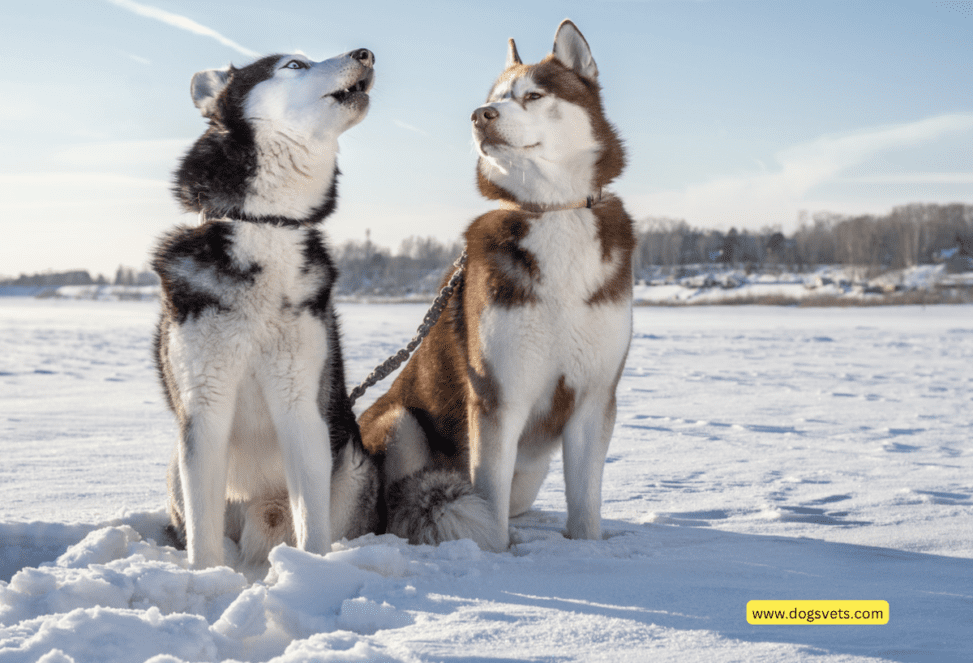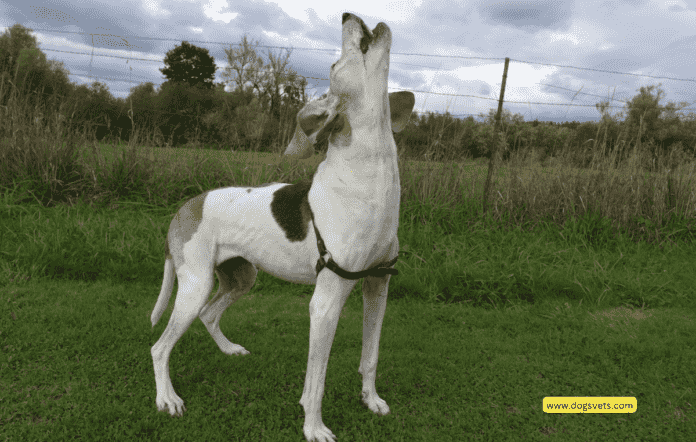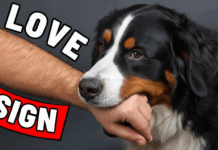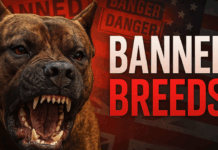Last Updated on September 3, 2024 by Dogs Vets
Why Do Dogs Howl at The Moon?
Dogs howling at the moon is a behavior steeped in folklore and mystery. While it may seem like your furry friend is serenading the night sky, the reasons behind this behavior are rooted in instinct and communication. Let’s dive deeper into the possible explanations for why dogs howl at the moon and explore the scientific perspectives behind this intriguing phenomenon.
The Ancestral Call: Instinct and Communication
Dogs are descendants of wolves, and many of their behaviors, including howling, have been passed down from their wild ancestors. Howling serves as a form of long-distance communication among wolves, allowing them to locate each other and coordinate hunting efforts. Similarly, your dog may howl at the moon as an instinctual response to their need for connection and communication.

While the moon itself may not be the direct cause of this behavior, the nighttime environment, with its quiet and stillness, amplifies sounds, making it an ideal time for dogs to vocalize. Dogs howl to communicate their presence, assert territory, and express emotions, much like their wolf ancestors.
Is the Moon Really to Blame?
The idea that dogs howl specifically at the moon is more myth than reality. However, the full moon can influence canine behavior in subtle ways. The increased brightness during a full moon enhances visibility, which can make dogs more alert to movements and sounds in their environment. This heightened awareness may trigger their instinct to howl.
Moreover, the full moon’s effect on wildlife activity can also contribute to dogs’ howling. Nocturnal animals are more active during a full moon, which may prompt dogs to howl in response to the increased stimuli around them.
Social and Territorial Behavior
Howling is also a reflection of dogs’ social nature. As pack animals, dogs rely on vocalizations to stay connected with their pack members, whether they are other dogs or their human family. When a dog hears another howl, even from a distance, it may feel compelled to join in, reinforcing social bonds.
In addition to social communication, howling can serve as a territorial signal. Dogs may howl to mark their territoryand ward off potential intruders. This behavior is particularly noticeable in dogs with strong guarding instincts.
The Full Moon Effect: Myth or Reality?
The Full Moon Effect has been a topic of fascination for centuries. While the idea of the moon directly influencing canine behavior remains largely anecdotal, some studies suggest that animal activity does increase during full moons. For dogs, this heightened activity, combined with increased visibility, could trigger their howling instincts.
However, it’s essential to note that not all dogs howl at the moon. Individual differences, breed tendencies, and environmental factors all play a role in determining whether or not your dog will engage in this behavior.
The Role of Sensory Stimulation
Dogs have exceptional senses, particularly at night. Their heightened sense of sight, hearing, and smell makes them more attuned to the world around them, especially in low-light conditions. Moonlight can enhance their vision, allowing them to see and perceive movements that we may not notice. This sensory stimulation may prompt them to vocalize, including howling.
Additionally, sounds travel further at night, and your dog may be responding to distant noises that are more pronounced in the quiet of the night.
Wolf Ancestry: A Link to the Past
The connection between dogs and their wolf ancestry provides further insight into why dogs may howl at the moon. Wolves howl for various reasons, including to locate pack members, signal territory, and communicate during hunts. While domesticated dogs no longer rely on these behaviors for survival, the instinct to howl remains deeply ingrained.
When your dog howls, it’s tapping into these ancient instincts, channeling the behaviors of its wild ancestors. This connection to their wolf heritage is a fascinating aspect of canine behavior and one that continues to captivate dog owners.
Human Influence on Howling Behavior
Interestingly, human behavior can also influence why dogs howl. Attention-seeking is a common reason dogs vocalize, and if a dog learns that howling at the moon elicits a reaction from its owner, it may continue the behavior for attention. Additionally, if humans join in or encourage the howling, it reinforces the behavior as a form of bonding or shared activity.
Scientific Perspectives on Howling
Scientists have proposed several theories to explain dogs’ howling behavior. Some believe it is a remnant of their evolutionary past, while others suggest that certain breeds are genetically predisposed to howl more than others. Studies have shown that breeds like Huskies and Malamutes, which have strong ties to their wolf ancestors, are more prone to howling.
Environmental factors, such as the presence of a full moon or quiet surroundings, can also influence a dog’s likelihood to howl. While scientific research on this topic is ongoing, it provides valuable insights into the complex and instinctual nature of canine behavior.
Conclusion: Embracing the Mystery of the Howl
While the exact reasons why dogs howl at the moon may never be fully understood, it’s clear that this behavior is a blend of instinct, communication, and environmental influences. Whether rooted in their wolf ancestry or triggered by sensory stimulation, howling is a natural expression of a dog’s connection to the world around them.
So, the next time you hear your dog howling at the moon, remember that they are simply channeling their inner wolf, communicating with their surroundings, and embracing their wild heritage.
References
- American Kennel Club (AKC) – Why Do Dogs Howl?
Link: AKC – Why Do Dogs Howl? - VCA Animal Hospitals – Howling in Dogs
Link: VCA – Why Dogs Howl - PetMD – Why Do Dogs Howl?
Link: PetMD – Dog Howling - National Geographic – Do Dogs Really Howl at the Moon?
Link: National Geographic - Quora: Why-do-dogs-howl https://www.quora.com/Why-do-dogs-howl
- Humane Society – Understanding Your Dog’s Behavior
Link: Humane Society – Dog Behavior
Fact Check
We strive to provide the latest valuable information for pet lovers with accuracy and fairness. If you would like to add to this post or advertise with us, don’t hesitate to reach us. If you see something that doesn’t look right, contact us!

















